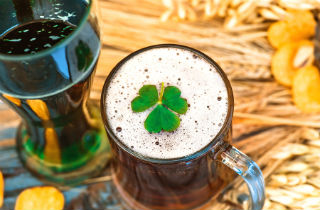How many Irish people have drinking problems?
According to the national charity Alcohol Action Ireland, Ireland is one of 26 nations in the European Union with the highest alcohol consumption rates per capita. In fact, the Irish drink about 20% more than the average European.
In addition to total consumption of alcohol, Irish drinkers also cross the line from casual drinkers to problem drinkers. It is estimated that over half of all Irish drinkers are problem drinkers. If 80% of the total adult population of 3.2 million people drink, that means that around 1.3 million Irish people have a drinking problem. Researchers further break down the demographics like this: 40% of female drinkers and 70% of male drinkers have a harmful patterns of drinking.
And the cost of alcohol problems is enormous in Ireland. Alcohol-related costs in Ireland are estimate at 3.7 billion Euro a year, including health, missed work and crime, about 3,318 Euros per taxpayer. And going to work hungover doesn’t help, either. Hangover definitions account for a number of absences, or can increase public danger as people work through hangovers.
But why do the Irish, in particular, seem to drink to excess? Is drinking truly socially endemic to the culture of Ireland, do genetics play a role, or is family structure causing alcohol problems? Are there other reasons that account for the enormous social costs of alcohol consumption?
Why do Irish people drink so much alcohol?
Irish people drink alcohol for the same reasons other populations drink. For example, drinking is often an activity modeled by parents or peers, helps relieve stress or is part of normal development and coming-of-age transitions. And problem drinking can be a combination of genetics (nature) and environmental factors (nurture). The reasons why people drink alcohol varies, but drinking alcohol, and particularly excessive drinking, plays a complex role in Irish society and is integrated within the culture. We attempt to explore here.
Affordability – The cost of alcohol in Ireland has decreased in the past decade. And stores that want to attract new customers often sell alcohol below unit-cost or in combination with special promotions.
Availability – In the past decade the availability of alcohol in Ireland have increased. Opening hours for stores selling alcohol were extended and the number of premises authorized to sell a full range of alcohol products increased by almost 70%.
Cultural and social normalization – Many people generally drink alcohol in Ireland for pleasure, relaxation and sociability. But intoxication is an acceptable social act in Ireland, either weekly or on special occasions. So, people in Ireland may engage in excessive and heavy drinking patterns because binge drinking is now the social norm.
Government inaction – As of 2008, there was no national structure, agency or body taking responsible for implementing government alcohol policies. Without governance, change in laws or oversight, people tend to continue harmful behaviors.
Marketing – In Ireland, teenagers are exposed to alcohol brands early. As a result, alcohol marketing contributes to the normalization of alcohol among young people. For example, almost one in four 16 to 21-year-olds own alcohol branded merchandise, such as clothing in Ireland. Half the ads in teen top 10 lists promote alcoholic products. And, one in three teens have seen alcohol ads while using Facebook.
If you have anything to add to this article, please do so below. We invite all comments and feedback.









Related Posts